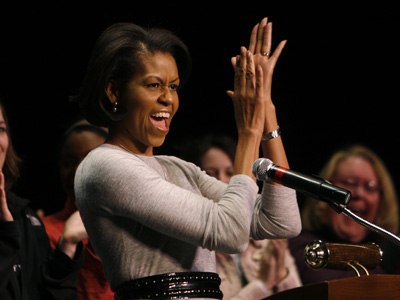
Wince.
If you follow politics and world events at all, even Barack Obama supporters had to have winced when Michelle Obama said, “”Let me tell you something — for the first time in my adult lifetime, I am really proud of my country.” (See the video and the full quote here.)
You had to know that we’d be off and running. The TV pundits would be occupied for days, the bloggers would be up in arms, and pretty soon the campaign would come down to a debate of who’s the real American in the race. We all know where this is headed, because we’ve been down the road so many times.
Cindy McCain had a not-so-veiled retort to Mrs. Obama on Tuesday when she said, over and over again, at a campaign stop, “I’m proud of my country.”
I see your wince, and I raise you a wink.
So let the record show that what we have here at this point in time are the spouses of two presidential candidates who are proud of their country.
Sure, but who’s the “patriotic” one? That can’t really be answered until we reignite the debate surrounding a much more critical question: what does it mean to be patriotic?
When last we visited this question, “Liberate Iraq” signs still dotted the lawns of America, and the American media was taking a pass on doing its job out of fear, some say, that it would be labeled unpatriotic.
USA Today‘s survey a few years ago revealed that 94.5% of those polled consider themselves patriotic, though agreement on what the word means was hard to come by.
In a general way, patriotism means love of country — love of one’s country, one’s homeland — a very simple emotional attachment to the place where you’re from,” says Jack Citrin, professor of political science at the University of California at Berkeley.
“After that, agreement tends to dissolve.”
Some people religiously salute the flag; some wrap themselves in the flag — literally. Others burn it and say patriotism is about protest.
Peter Canellos of the Boston Globe, in a June 2005 op-ed piece, summoned the words of William Dean Howells, the superintendent of libraries in New York in 1912, when he said.
‘While I would wish you to love America most because it’s your home, I would have you love the whole world and think of all the people in it as your countrymen. You will hear people more foolish than wicked say ‘Our country, right or wrong,’ but that is a false patriotism and bad Americanism. When our country is wrong she is worse than other countries when they are wrong, for she has more light than other countries, and we somehow ought to make her feel that we are sorry and ashamed for her.”
Canellos said no one — left or right — would disagree with Howells’s claim that the U.S. has more light than other countries. “People disagree only on whether the greater light is immutable or must be fed, like a fire, through conflict and dissent.”
What is your definition?
